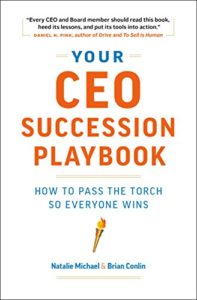4 Things for HR to Remember When Handling the CEO Handoff
When there is a change in the CEO role it is a delicate process for HR professionals.
Do you keep the promotion under wraps until the last minute? Announce it months in advance? Who needs to be in the know early? Who will be surprised or maybe even upset that a new CEO is coming in? How might this impact other talent within your organization?
The worst situation is when there are internal candidates for a CEO vacancy and the CEO handoff experience and announcement is poorly thought out, leaving CEO contenders embarrassed to hear that they “lost out” on the role in public ways. Or, when a new CEO ends up negotiating their new job package with their VP, HR (a direct report) instead of the Board Chair. Awkward.
When there is a CEO handoff, the experience impacts the entire organization and needs to be one thing: thoughtful.
Be caring here. Be human. Think about people and the impact of the experience on their confidence and, ultimately, on their productivity. In that light, let’s explore how the CEO handoff experience can get mucky, and an example of how to do it thoughtfully and well.
Here are four key things for HR professionals to keep in mind when handling the CEO handoff.
1. The Handoff Hurts Some
When people compete for the CEO job and lose out, it can hurt. This occurs for a number of reasons. First, competitive people don’t like to lose; they strive to win. Flip the script here: how would you feel in this scenario?
Secondly, a fundamental human need is to have some control over one’s destiny. When people lose a competition, it can feel as if a choice was “taken from them,” which is not a good feeling for someone who likes to take charge and make things happen. Thirdly, losing can lead to affective forecasting — that miserable feeling where you feel down in the dumps and you fear you will stay there forever.
Essentially, rejection hurts.
2. Easing the Pain of the CEO Hand Off
The good news is that as the HR leader you can ease the pain of rejection for candidates with a good dose of emotional intelligence and influence. If you were rejected for an opportunity that mattered to you, wouldn’t you feel better if someone took the time to have a reset conversation with you? What if they helped you figure out what’s next as new information became available?
I recently co-authored a book, Your CEO Succession Playbook: How to Pass the Torch so Everyone Wins, in which I interviewed 30 CEOs. Half of them left the CEO role as part of a CEO handoff, and half took over the role and were successful.
One CEO I interviewed offered an enlightening example of a CEO promotion experience marked by emotional intelligence.
While acknowledging that there will inevitably be a winner and losers when there are internal candidates in a CEO handoff, he affirmed that candidates don’t need to “feel” this way. When selecting a CEO, he wants each candidate, regardless of the outcome, to feel valued and appreciated for being important to the long-term success of the company. Notably, in this case, when the board appointed a new CEO to replace him, every single one of the candidates stayed with the organization.
3. A Case Study: A Thoughtful Experience
Here is how his CEO handoff experience unfolded.
When choosing his successor, this CEO was firmly committed to fostering a winning feeling in each of the candidates. As part of the selection phase, he put each candidate through a high-profile and rigorous selection process, which included a personal discussion with him about the respective candidate’s strengths and limitations for the role. He made it clear that no CEO candidate was perfect and that the most successful leaders design careers around their personal strengths; facing their weaknesses enables them to build a complementary team.
Once the CEO selection decision was made by the board, he sat down with each candidate and told them:
“You were part of this process because I believe in your potential. Although you didn’t get the job, I know you are an important part of the company’s future. I’ll be your advocate. Can we discuss how to work with the incoming CEO to craft a role in this organization that uses your strengths and expands your contribution?”
Using input from the outgoing and incoming CEO, each candidate received a customized development plan and, whenever possible, their job scope was adjusted. They all stayed with the business; the company continued to grow and was later sold at one of the highest valuations in its industry — ever.
I admire this CEO’s approach because, as an executive coach I have an inside view of what this win-lose dynamic is like for candidates. We coach candidates when they are trying to process their disappointment and what it means to them. There’s a lot of defensive self-talk during this process. Often the self-talk starts out self-berating: “What did I do wrong?” “Why didn’t I make it?” And then it becomes self-protective: “Don’t they see how good I am?”
4. HR Keeps Care and Communication at Core
When candidates feel undervalued or underappreciated, this can trigger a flight response, leading to behaviour like taking unsolicited calls from headhunters. This is when your job as the HR leader gets trickier.
As an HR professional, your most valuable role is to act an advisor in the CEO handoff, helping the team to understand the best process to follow, clarifying roles and keeping communications open to minimize fears, while helping the new CEO get acquainted with the people inherited and the political dynamics of the organization.
This is ultimately an opportunity for HR professionals to show each stakeholder that you care about them: from recognizing the outgoing CEO in heartfelt ways, to honouring all those involved in the process to building even stronger organizational futures with the incoming CEO.
Natalie Michael, CPHR is a CEO and executive coach with waterfront-partners.com. She is also the author of The Duck and The Butterfly: Coaching Questions for Leaders at Work and the co-author of Your CEO Succession Playbook: How to Pass the Torch so Everyone Wins.









